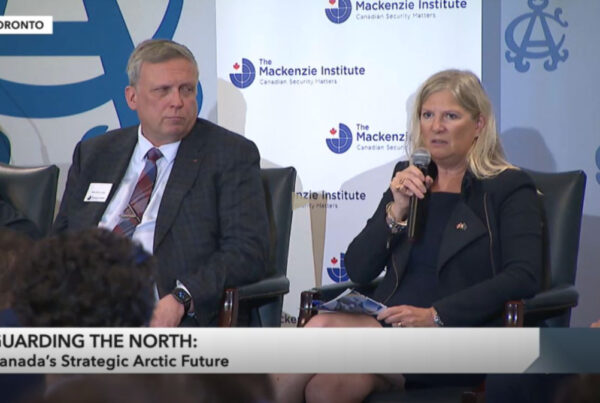Above: panelists Robert Baines, LCol. Agris Ozoliņš, BGen Stephen Cadden, Dr. Kenneth Geers, and James Poborsa make up Panel 1 of our “Positioning for Peace Preservation: The New Form of Peacekeeping” on November 30, 2017 at the Royal Canadian Military Institute.
Robert Baines: is the President of the NATO Association of Canada and the Executive Director of the Canada-Albania Business Council. He has extensive experience working with NATO issues and the Canadian defence establishment. He is a member of the Canadian Armed Forces Reserve and has received the Canadian Forces Decoration.
LCol. Agris Ozoliņš: is the Defence, Military, Naval and Air Attache of Latvia to Canada. He joined the Latvian National Armed Forces in 1992 and has served in various command and staff positions including in the Latvian National Guard, Latvia’s Land Forces, at the Training and Doctrine Command and also at the Joint Headquarters, and the Ministry of Defence of Latvia. He accredition occurs at the time of the launch of the enhance Forward Presence deployments to the Baltic States and Poland.
BGen. Stephen Cadden: joined the Canadian Armed Forces in 1984. He has been employed internationally in Germany and Jamaica, and deployed operationally to Afghanistan (ISAF liaison to CJTF 76) and Haiti (Chief of Staff, the United Nations Stabilization Mission in Haiti [MINUSTAH] military component).
Dr. Kenneth Geers: is a COMODO senior research scientist based in Toronto, and a non-resident senior fellow at the Atlantic Council’s Cyber Statecraft initiative. In addition, he is a NATO Cooperative Cyber Defence Centre of Excellence (NATO CCD COE) ambassador, an affiliate with the Digital Society Institute-Berlin, and a visiting professor at Taras Shevchenko National University of Kyiv in Ukraine.
James Poborsa: is a senior Research Fellow and Co-Editor-in-Chief at the NATO Association of Canada, and a doctoral candidate in the Department of East Asian Studies at the University of Toronto. He has taught multiple courses on the history, politics, and culture of modern East Asia and was previously a visiting doctoral fellow in the Department of Chinese Language and Literature at Tsinghua University (2014-2015). His current research project explores academic and policy debates in China surrounding the concept of China’s peaceful rise (heping jueqi 和平崛起), military moderninsation, and issues of sovereignty and territorial expansion in the South China Sea. With a specific focus on the history of Chinese naval policy and the recent resurgence in the thought of Alfred Thayer Mahan, his work seeks to address the historical justifications given for China’s ongoing territorial claims throughout the region.








